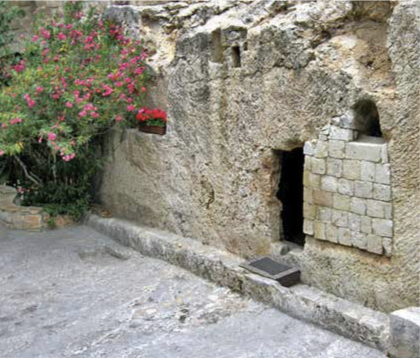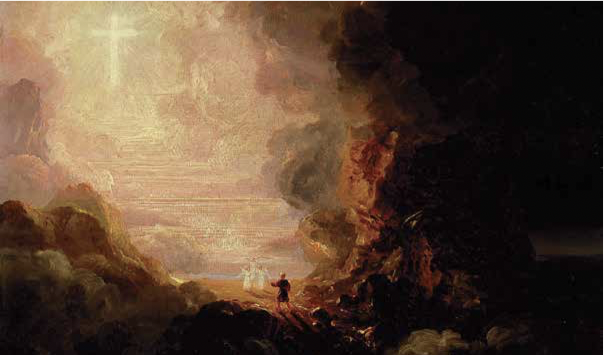The Most Important Message
This booklet presents the truth that God’s Word provides the foundation for civil government as it speaks to all other areas of life. When evaluating the credibility and merit of the Bible it is significant to note that history, archaeology, and science have consistently proven the remarkable preservation of the text and the accuracy of the accounts, claims, and prophecies of the Bible, and not a single portion of Scripture has been shown to be false or inaccurate. Additionally, as this booklet has presented, the Bible provided the foundational principles upon which the most effective governmental system in the world—the American Constitutional Republic—has rested. While the Christian takes God’s Word to be infallible by faith, the above points should provide significant reason for anyone to seriously consider the words of this all-time best selling Book.
In addition to its messages on government and living, God’s Word contains the most important message of all time—that there is hope for eternal life and a relationship with the One True God and Creator of the universe. He judges with justice, righteousness, mercy, and compassion. The Scriptures rightfully name Him the King of kings and Lord of lords (1 Timothy 6:15). His Name is Jesus Christ and Acts 4:12 tells us that there is salvation in no one else. Jesus Christ is not only the giver of eternal life (Romans 6:23b), but He is the provider of lasting peace, joy, and hope. He is the One Who said: “Come unto me, all ye that labour and are heavy laden, and I will give you rest” (Matthew 11:28). His loving-kindness and faithfulness are everlasting (Psalm 100:5). If you do not know with absolute certainty that you have eternal life through Jesus Christ, this final message is specifically for you.
Hebrews 9:27 tells us that “It is appointed unto men once to die, but after this the judgment.” Judgment implies that there is a judge and one to be judged—just as civil government provides a system for punishment for criminals, God’s word provides a system of judgment for sinners. The Bible explains in Romans 3:23 that we (mankind) are all sinners: “For all have sinned, and come short of the glory of God.” The Scriptures further explain that the punishment for sin is death (Romans 6:23). The good news is that the Creator of the world (Jesus Christ is the Creator according to John 1:1-4; Colossians 1:16; and Hebrews 1:2) is a God of mercy and compassion and His Word states that He is not willing that ANY should perish, but that ALL should come to repentance (2 Peter 3:9). Therefore, God (who is three persons in One—1 John 5:7) stepped into the universe and took on the form of a man—Jesus Christ—to provide a way for mankind to escape eternal damnation. [Death came into the world as a result of Adam’s sin in the Garden of Eden (Romans 5:12).]
How did Jesus provide this escape for sinners from eternal damnation—the way of salvation? He left Heaven to walk upon the earth with mankind over 2000 years ago, performing all manner of kind, compassionate, and loving acts, including countless healings and raising people from the dead. As God in the form of man, He was sinless, and therefore was the only one to have both the right (as our Creator) and the ability (as a sinless being) to solve our sin problem. He chose to take the sins of the world upon Himself and therefore our punishment as well: “For He [God] hath made Him [Jesus] to be sin for us, who knew no sin; that we might be made the righteousness of God in Him [Jesus]. He died in our place—the horrendous death of crucifixion. The death He chose was one of the most brutal of all. He was beaten and treated mercilessly. Yet as Isaiah 53:5 explains, He willingly did this for us: “He was wounded for our transgressions, He was bruised for our iniquities; the chastisement for our peace was upon Him, and by His stripes we are healed.” The Biblical account of Jesus’ crucifixion describes that as the Lord Jesus was hanging on the cross, darkness fell on the earth, even though it was only mid-afternoon. This symbolized God’s punishment on the sins that Jesus was taking upon Himself. As a final picture of Jesus’ unconditional love for mankind, He cried out to His Father in Heaven for the forgiveness of His persecutors (Luke 23:34) before He— as God Himself—gave up His own Spirit (Luke 23:46).

Since no unrighteousness (sin) is allowed into Heaven, Jesus had to take this step for us to free us from the chains of sin’s bondage. But He did not stay dead. As proof of His deity, death was not able to hold Jesus captive— He is the only One Who has power over death. On the third day He arose from the dead—conquering death! His tomb was found empty and as proof of his true resurrection, He appeared to over 500 people (1 Corinthians 15:6). Romans 5:8 and John 3:16 describe the extent of God’s great love and infinite mercy for us: “But God commendeth his love toward us, in that, while we were yet sinners, Christ died for us.” John 3:16: “For God so loved the world, that he gave his only begotten Son, that whosoever believeth in him should not perish, but have everlasting life.” Christians are given everlasting life and have the joy of knowing that they will spend eternity with the Lord Jesus Christ and fellow Christians in the pure, perfect, and sinless home of Heaven. Jesus Himself is preparing our eternal home for us: “Let not your heart be troubled: ye believe in God, believe also in me. In my Father’s house are many mansions: if it were not so, I would have told you. I go to prepare a place for you. And if I go and prepare a place for you, I will come again, and receive you unto myself; that where I am, there ye may be also” (John 14:1-3). The amazing blessing of the Gospel of Jesus Christ is that it is completely free—there are no works needed to obtain salvation according to Ephesians 2:8-9: “For by grace are ye saved through faith; and that not of yourselves: it is the gift of God: not of works, lest any man should boast.”
If, at hearing this good news, you find yourself joining millions of others in asking, “What must I do to be saved?” The answer is made clear in Romans 10:9: “That if thou shalt confess with thy mouth the Lord Jesus, and shalt believe in thine heart that God hath raised him from the dead, thou shalt be saved.” This invitation is open to all: “For whosoever shall call upon the name of the Lord shall be saved” (Romans 10:13). If you desire a personal relationship with the God of the Bible and believe that you are a sinner in need of a Savior, then believe that Jesus came to earth as a man, suffered for the sins of the world by dying in our place, and raised Himself from the dead. As you call upon His Name for the forgiveness of your sins and confess that Jesus is Lord, His promise is that you will be His child and enter into His eternal rest in Heaven. While you remain on earth as His child, you can be assured of His unconditional love promised in Romans 8:38-39 by the Apostle Paul: “For I am persuaded, that neither death, nor life, nor angels, nor principalities, nor powers, nor things present, nor things to come, nor height, nor depth, nor any other creature, shall be able to separate us from the love of God, which is in Christ Jesus our Lord.”

Once to Every Man and Nation
James Russell Lowell, 1819-1891
Once to every man and nation, comes the moment to decide,
In the strife of truth with falsehood, for the good or evil side;
Some great cause, some great decision, offering each the bloom or blight,
And the choice goes by forever, ’twixt that darkness and that light.
Then to side with truth is noble, when we share her wretched crust,
Ere her cause bring fame and profit, and ’tis prosperous to be just;
Then it is the brave man chooses while the coward stands aside,
Till the multitude make virtue of the faith they had denied.
By the light of burning martyrs, Christ, Thy bleeding feet we track,
Toiling up new Calv’ries ever with the cross that turns not back;
New occasions teach new duties, time makes ancient good uncouth,
They must upward still and onward, who would keep abreast of truth.
Though the cause of evil prosper, yet the truth alone is strong;
Though her portion be the scaffold, and upon the throne be wrong;
Yet that scaffold sways the future, and behind the dim unknown,
Standeth God within the shadow, keeping watch above His own.
